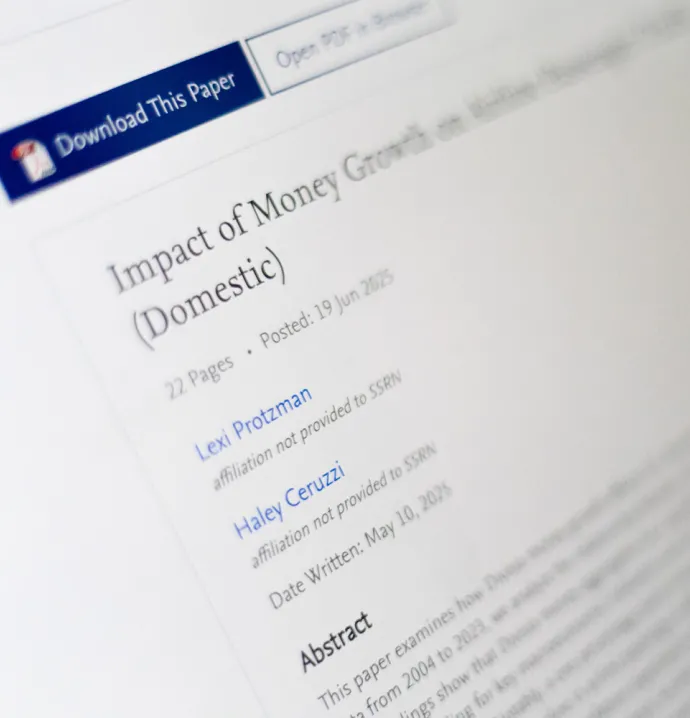What if... We focused on the problems we actually have?
What if... We focused on the problems we actually have?

Periodically, my wife will give me homework assignments. Not the “honey do” jobs around the house that most partners get—she knows I create more problems than I ever fix—but reading or writing chores, just like I give my students. Her most recent dictate was to read a 30-year-old article from the Harvard Business Review, “What’s the Matter with Business Ethics?” by Andrew Stark. Because business ethics is my home field, I decided to comply. My study of business ethics began in the mid-1990s, not long after the article was originally published, so it also served as a way for me to review progress in the field.
Dr. Stark discusses a variety of topics in his paper, but for this column I want to focus on the first issue he explores. He presumes that the primary purpose of business ethics is to provide practicing managers with “concrete assistance with…two kinds of ethical challenges” (this sounds like a reasonable assumption, but having been in the academic field for over a quarter century, I’m not sure his view is universally held among business ethicists). The two types of ethical challenges he discusses are:
- identifying ethical answers in gray areas. I strongly disagree with the validity of his concern here. As I continually tell my students, by the very nature of ethical dilemmas, there is no “right” answer, and there are multiple right answers. Ethical situations are, by definition, messy, without clear “good” and “bad” answers.
- navigating those situations where the right answer is clear, but competitive and institutional pressures point managers in a different direction. This is the question I think is more legitimate and highly relevant today.
I want to explore Stark’s second concern with a specific issue that I find both pressing and illustrative. My contention is that we (humans) face a fundamentally different problem today than the central issue we have had since we’ve been around. Throughout human history, our basic problem has always been survival. How do we get the things we need just to see tomorrow? We have always worked to provide adequate food, clothing, and shelter for ourselves.
Today, we have basically solved that problem. According to the United Nations and the blog Progressiprocity, we already produce enough food to feed and clothe everyone in the world, and have the capacity to feed, clothe, and shelter some 12 billion people to standards of the Western world (world population is about 7.8 billion as I write this). Obviously, we still have a problem, but NOT one of production or scarcity. After all, we still have billions of people who don’t have enough to eat.
So, what IS today’s problem? It’s no longer scarcity, but almost the opposite one of how we should distribute the sufficient resources we have. And that decision necessarily takes place within the fact of reaching the limits of our natural resources. And that puts us squarely in the realm of ethics. What is the “right” thing to do with the resources we have? I don’t think this is really a gray area, as Stark’s first concern states. It seems pretty clear to me that if I have plenty to eat and my neighbor is hungry, I should share. Instead, it puts us clearly in that second area, when we have a pretty good idea of what the right thing to do is, but competitive and institutional pressures push us in a different direction.
What is pushing us in the wrong direction? Primarily, business.
Everything we “know” about business is that the dominant (some would say only) focus is making money. Almost the entire curriculum in American business schools focuses on profit generation. In some courses, we actually teach our students and workers to ignore other issues such as ethics. Thus, our business competition and markets push us not to share, but to sell our resources only to those who can afford them.
Back in the 1990s, I decided to study business ethics for a variety of reasons, but the main one was my conviction that business is the primary force in our society (and in most of the world). It has the most profound effects on our lives of any social institution, including government and religion. So, if we are going to make any significant changes, I believe it must be through business. But business, as it is practiced in the USA, is focused almost solely on short-term profits, market share, and competition (what Alfie Kohn describes as “mutually exclusive goal attainment” in his book No Contest).
Let’s take a moment here, to just think about the nearly complete change in mindset that I am suggesting—going from overcoming scarcity by competing and hoarding (we can always talk about the huge and increasing gaps in wealth and income in the West) to one of seeing that we have enough for everyone, as long as we decide to share it. We also have to make this change, in spite of humans’ pronounced tendency to always “fight the last war.” Resistance to change, even (perhaps especially) in the ways we think, is so commonly recognized, that it has reached cliché status.
Jon Shepard, the head of my dissertation committee at Virginia Tech, always stressed to me ideas matter. What and how we think drives everything else. On top of changing the ways we think about distributing goods and services, we simultaneously need to figure out how to avoid the worst effects of climate change. Not only do we have to figure out how to solve serious—existential—problems, but before we can do that, we first have to recognize that we face a different problem. And, we simply are not very good at that.
We need to abandon the central question that has been our focus ever since the beginning of human history—scarcity and survival—to one of distribution and constraint. David Korten captures this change in perspective in his book When Corporations Rule the World. He talks about the different environment that cowboys on the frontier encountered, seemingly endless resources and the ability to dispose of waste; and what astronauts face in a spaceship, where supplies are extremely limited and all wastes must be contained and recycled. In essence, we must become cowboys in a spaceship.
The same David Korten, in a talk given to the International Humanistic Management Association (at approximately 56:20 in the video) describes a doctoral seminar he taught in the 1970s at the Harvard Business School called “Management and the Future.” He says, “[I]f we took these issues to The Limits to Growth [another book he wrote] seriously, how would humanity and business, and business education have to change?....Is the purpose of the Harvard Business School [and business schools in general] to prepare young people for success in business as it exists [emphasis his], the system of business as it exists, or is it to prepare those students to transform that system? I think that is exactly the question we face here.”
To redirect my point back to the beginning of this essay, Stark wanted the field of business ethics to be more useful to practicing managers. Of his two primary concerns, I think the one about clear ethical directions being interfered with by competitive and institutional pressures is clearly the one we need to address now. So my answer to Korten’s question is we absolutely need to prepare our students to transform the system of business as it exists now. If we don’t, we will continue to contribute to the looming catastrophe. If we do, we just may contribute a small bit to a possible transformation, but we know it will be a long and difficult process.
One small example of this change is an exercise I have recently begun doing with my strategy students. We try to imagine what kind of a strategy firms would need to create to compete in a “de-growth” economy (in which we start reducing production to stay within planetary limits). So far, they aren’t very good at it—but then, neither am I. I doubt any of us will be, until we start addressing the new, REAL problem facing humanity.
The views and opinions expressed are those of the author and do not imply endorsement by the University of Northern Iowa.




